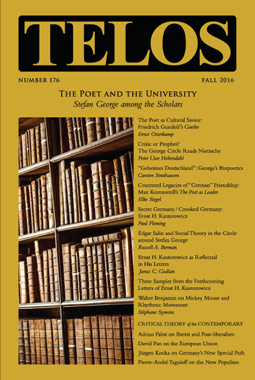 One often speaks of the importance of poetry for thought, even of poetry as a mode of thinking, and perhaps nowhere more than in Germany, the country of Dichter and Denker, of poets and thinkers. The German intellectual tradition is defined by a long, intimately interwoven relation between poetry and thought going back to the solidification of the Modern Age in the eighteenth century: Klopstock’s “Republic of Letters”; Goethe and Schiller’s Classicism, especially Schiller’s “aesthetic state”; Hölderlin’s “founding poets” and the centrality of poets in “the time of need”; Jena Romanticism’s inextricable relation between “Symphilosophie” and “Sympoesie”; Hegel’s definition of beauty as “the sensible shining forth of the idea”; and onward to this day.
One often speaks of the importance of poetry for thought, even of poetry as a mode of thinking, and perhaps nowhere more than in Germany, the country of Dichter and Denker, of poets and thinkers. The German intellectual tradition is defined by a long, intimately interwoven relation between poetry and thought going back to the solidification of the Modern Age in the eighteenth century: Klopstock’s “Republic of Letters”; Goethe and Schiller’s Classicism, especially Schiller’s “aesthetic state”; Hölderlin’s “founding poets” and the centrality of poets in “the time of need”; Jena Romanticism’s inextricable relation between “Symphilosophie” and “Sympoesie”; Hegel’s definition of beauty as “the sensible shining forth of the idea”; and onward to this day.
|
|
||||
|
Telos Press Publishing · PO Box 811 · Candor, NY 13743 · Phone: 212-228-6479 Privacy Policy · Data Protection Copyright © 2025 Telos Press Publishing · All Rights Reserved |
||||


